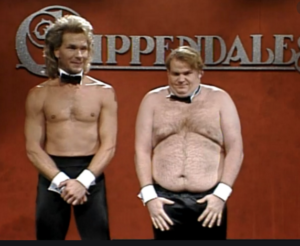
SNL- Patrick Swayze & Chris Farley
The size of one’s brain, or certain brain areas, has been extensively studied and implicated in relation to intelligence. It’s presumptuous, but bigger is always better… right?
Wet brain weight at autopsy, as well as three-dimensional imaging studies, have suggested that larger brain size may correlate with excelling in academics and life achievements, even after accounting for body size, age and sex.
In slight contrast, autopsy photographs of Albert Einstein’s brain may suggest subtly different findings. While the actual brain of Einstein is no longer intact and in fact some of the pieces are lost and cannot be found, photographs from the 1950’s suggest that his brain may be “average” size (weighting 1,230 grams), but certain areas of his brain were “larger”. Einstein may have had “extra gyri” and an enlarged prefrontal area.
New research, however, debunks this whole concept that size, alone, bears any favor.
In 2004, a study was performed looking at hippocampal volume and memory ability over a person’s lifespan. The hippocampus is implicated (somewhat overly… as the entire cerebral cortex likely functions to subserve the learning and retrieval of facts and events) to intimately be involved in memory. However, this study indicated that children and young adults have good memory yet small hippocampi. In older adults, the size of the hippocampus seems completely unrelated to their memory.
A newer study from 2019 helps us understand this, suggesting that it’s not the hippocampal size that matters, per se, but the hippocampus’s interaction with other brain areas. Having a larger hippocampus is important, but only if its functioning well with related limbic areas. A larger size was associated with diminished memory and learning for individuals who had reduced connectivity. This finding may also factor in the role of higher education and learning throughout life. The size of certain brain structures may be fixed by genetics but active learning promotes circuitry. Advanced schooling in early adulthood and persistent learning at older age is likely the best way to promote lifelong intelligence, memory, cognition. “Use it, or lose it”
It’s kind of like the Saturday Night Live Chippendales skit. Being bigger (fatter) alone didn’t make Chris Farley a good Chippendale… Bigger muscles and connecting those muscles with slick dance moves made Patrick Swayze… well Patrick Swayze.






